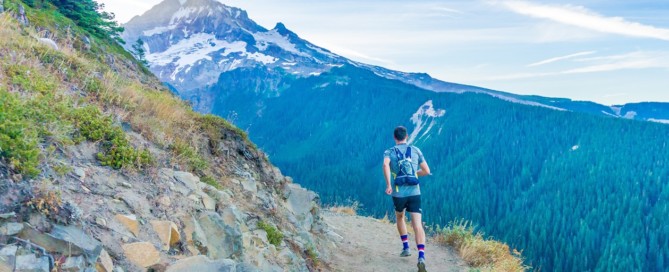Now that we’re getting into spring weather, you’re looking into running trails! But, if you’re just starting out, do you really need dedicated trail shoes? Can you just get by with your road shoes? Do you really need to make another investment in a second (or third, or fourth, or fifth) pair?
There is no one answer to this question — answers all start with “Depends on [blank]”. So, let’s consider a few of those blanks and examine why you should really go grab yourself a good pair of trail running shoes!
One question I ask trail runners-to-be is what kind of trails they’re planning to run. Runners can get really liberal with the term “trail” — it can mean everything from a flat dirt path adjacent to a road to gnarly mountain climbs and steep cliffside trails. A lot of the time it’s the former, and they’ll be just fine with road shoes. But, in the case of the latter, you can absolutely benefit from trail-specific running shoes. Rocky or muddy trails and steep climbs and descents all call for quality trail running shoes. You want a shoe that lets you run confidently — trails are notorious for twisted ankles and scraped elbows, knees, and legs, things we’re more likely to end up with if we go without good trail running shoes.
To get that confidence in a shoe on the trails, you need good traction and good protection underfoot. Trail shoes are becoming better and better at tackling all types of surfaces due to awesome multi-directional lugs and stickier rubbers. Those lugs, or teeth, are angled precisely for climbing on the forefoot and for descending on the midfoot and heel, giving the runner confidence on any grade of trail (grade referring to the steepness/angle of the ground). Many have rock plates underneath the foot to protect from rocks, roots, sticks and whatever else the trails might throw at you. Protection underneath your foot is key in keeping your feet happy and healthy over miles and miles of beautiful trails.
Trail running shoes are also versatile! While hitting asphalt and concrete with trail running shoes might not be a good idea, they can double as great lightweight hiking shoes. There is a time and a place for traditional hiking boots, but more and more, people prefer trail running shoes due to their lightness, flexibility, and nimbleness. They don’t give you the same ankle protection as stiffer high top boots, but unless you’re backpacking for several days, most people can get away with and end up preferring the more natural feeling of trail running shoes.
Finally, trail running shoes are more rugged and durable than road shoes, especially when they’re exposed to the elements. Road shoes will usually have a lightweight mesh or knit upper for comfort, flexibility, and breathability; however, those are prone to ripping or tearing easily if you encounter a sharp rock or branch. Trail running shoes are made to take bumps and scrapes, and often have extra overlays to account for those trail hazards. They’re meant to take more of a beating than your road shoes!
Yes, trail running shoes are an extra investment if you decide trail running (or even hiking in something less bulky than a boot) is for you, but in my opinion, they are definitely worth it. Having a pair in your rotation will not only give you better, more protective options, but it’ll also encourage you to get out on the beautiful landscapes around you more often! Now get out there and enjoy the trails!


